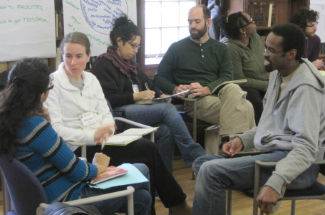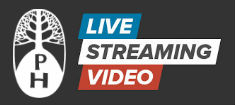Radical Faithfulness Program
An Intensive 9-Month Online/On-Campus Program
on Spiritual Activism and Faith-Based Organizing
(with five on-campus residencies)
From September 26, 2016 to May 22, 2017
Our Education Philosophy
People’s knowledge and understanding of their world is the consequence of education, regardless of its source. It can be by indoctrination, propaganda, rote memory, reflected-upon experience, or critical inquiry and dialogue—but it is all education. The issue at hand is what kind of education, to what end, and in whose interests?
—John Hurst, “Popular Education, Labor, and Social Change”
In this program, we are called to facilitate the education of spiritual seekers and people of faith who want to focus more of their personal, professional, and public lives on fostering a faithful and spiritually fulfilling transition towards a sustainable society that embodies respect and care for the community of life, social and economic justice, democracy, nonviolence, and peace.
This is not all that distant from Hurst’s educational goals. For the purposes of educating effective labor organizers and activists, Hurst argues that adult educators should rely most heavily on the principles and methods of “popular education.” As Hurst notes, “Popular education is at its heart the empowerment of adults through democratically structured cooperative study and action, directed toward achieving more just, equitable, and peaceful societies.”
As part of this “democratically structured cooperative study and action,” popular educators typically employ a wide variety of participatory, dialogic, problem-posing, reflective, and experiential learning methods, including discussions, deep dialog, one-on-one coaching, storytelling, arts and crafts, case studies, exercises, role-plays, and the actual practice of skills through simulations and engaged fieldwork in the wider community. At Pendle Hill, we also add worship, worship sharing, song, prayer, and ritual as part of our teaching and learning.
Like most popular educators we also focus on the following seven elements in our work:
- Building relationships and getting started as a learning community;
- Focusing on the experience and knowledge of participants;
- Looking for relevant patterns in their experience;
- Adding new information and theory;
- Practicing skills, strategizing, or planning for action;
- Applying learning in action settings outside of the classroom; and
- Reflecting on and evaluating the teaching and learning experience to support continuous improvement.
We believe that this is the best educational approach for this program—and the one that most encourages community, compassion, curiosity, creativity, joy, insight, growth, responsibility, and faithfulness.
For more information, click on the links below, or contact Steve Chase, Director of Education, at 610-566-4507, ext. 123.
 Program Overview
Program Overview
Who Should Participate?
What Students Say
Program Learning Objectives
Core Components of the Program
Program Schedule and Themes
Educational Philosophy
A Word About Online Learning
Program Costs and Scholarships
Program Faculty
Applying to the Program


